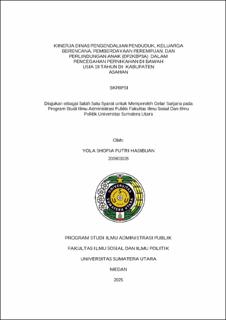| dc.description.abstract | This research focuses on analyzing the performance of the Office of
Population Control, Family Planning, Women’s Empowerment, and Child
Protection (DP2KBP3A) in Asahan Regency in its efforts to prevent marriages
under the age of 19. Child marriage is a complex social issue in Indonesia and
various other developing countries, with significant impacts on multiple aspects of
life, including reproductive health, education, economics, and social welfare. In
Asahan Regency, although there has been a decline in the number of marriages
under the age of 19 in recent years, this issue remains prevalent.
This study uses a descriptive qualitative approach with data collection
techniques through in-depth interviews with key informants, including DP2KBP3A
staff, the community, and program participants, as well as document analysis and
direct observation. The data sources include primary and secondary data, collected
through observation, documentation, and interviews. The data analysis technique
includes data reduction, data presentation, and data verification.
The results show that DP2KBP3A has implemented various preventive
efforts through the Generation Planning (GenRe) program, focusing on raising
awareness about the dangers of early marriage among adolescents and families,
increasing access to education, and providing reproductive health counseling.
However, field implementation faces several challenges, such as low public
awareness of the importance of preventing early marriage, minimal economic
support for at-risk families, and the strong influence of cultural norms that still
support underage marriage. From this analysis, the main recommendations
proposed include enhancing coordination between government agencies,
increasing reproductive health education programs for adolescents, empowering
economically vulnerable families, and using community-based approaches to
address cultural norms that support child marriage. | en_US |


